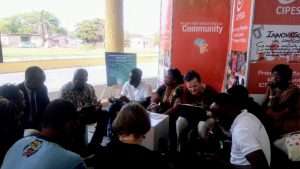By Simone Toussi |
The first African edition of Europe’s largest internet and digital society festival – re:publica – was held in Accra, Ghana, December 14-15, 2018 and drew in hundreds of participants to showcase and discuss how politics, the arts, innovation, and digital rights have been affected by an increasingly digitised society.
Co-organised by Impact Hub Accra, the German Federal Ministry for Economic Cooperation and Development (BMZ), and with the support of several partners including the Collaboration on International ICT Policy for East and Southern Africa (CIPESA), re:publica Accra aimed to strengthen Afro-German dialogue about digital issues, and to explore the intersection between digitalisation and collaborative developmental efforts.
CIPESA hosted a Digital Rights Lounge throughout the duration of re:publica, organised workshops on civic participation and online content regulation, and also participated in sessions on the work of investigative journalists and activists, among others.
The Digital Rights Lounge
To reflect its multi-disciplinary nature, re:publica Accra featured four lounges on health, digital creation, digital rights, and hardware innovation. CIPESA hosted the Digital Rights Lounge which featured organisations sharing experiences and showcasing work related to advancing digital rights in Africa.
The lounge featured an exhibition on the state of digital rights in Africa including visuals on press freedom, the gender dynamics of internet usage, access to information, data protection and privacy, affordability, non-discrimination, and network disruptions. This was complemented by research publications and videos on the ongoing efforts to engender progressive internet policies and practices that support human rights, innovation, and development.
Also presented at re:publica were key action areas that emerged from the 2018 Forum on Internet Freedom in Africa (FIFAfrica), which was held in Accra, Ghana, at the end of September 2018. Since 2014, CIPESA has held this annual forum that brings together various stakeholders to deliberate on gaps, concerns and opportunities for advancing privacy, free expression, non-discrimination and the free flow of information online on the continent. Previous FIFAfrica editions have been held in Uganda (2014-2016) and South Africa (2017).
Sessions held around the lounge included conversations on involving more girls in tech, privacy challenges, regulating emerging technologies, hands-on skills session on steganography, and online content creation. There was also a session on the work of the Freedom Online Coalition (FOC), which groups 30 governments who have committed to work together to advance human rights and fundamental freedoms online.
Advancing Civic Participation through Digital Technologies
Re:publica served as a platform to also share insights on the role of technology in social accountability, civic engagement, transparency and accountability, during a session titled ‘Advancing Civic Participation through Digital Technologies’. The session explored the opportunities and gaps in responsive solutions/platforms for civic participation and for transparency and accountability. Panellists presented cases studies on technology in governance including political mobilisation through print, broadcast and online media in Kenya; public finance tracking in Nigeria; parliamentary monitoring in Ghana; creating an enabling environment for civic technology in post-conflict Somalia; and service delivery monitoring and human rights reporting through ICT in East Africa.
The session also interrogated how the legislative landscape affects access and infrastructure, cybercrime, and access to information; and how, content regulation and taxation in the respective countries weaken the potential of technology-based initiatives to advance democratisation.
Impact of Online Content Regulation on Digital Rights in Africa
In this session, panellists discussed the online content regulation landscape in Africa with a focus on countries such as Tanzania, Uganda, DR Congo, Burundi and Zambia which in 2018 proposed or passed laws and regulations that undermine freedom of expression and access to information online.
These controls are undermining public confidence in the use of online platforms, and could lead to self-censorship and complete withdrawal from online discourse by ordinary citizens and by vocal bloggers and other social media enthusiasts. They are also leading to arrests of some journalists and social media users, including those that express legitimate.
The session comprised digital rights experts and researchers from Benin, Cameroon, Ghana, Tanzania, Uganda, Zambia and Zimbabwe who shared ideas on alternative approaches aimed at enhancing adoption and use of online platforms as well as content generation for advancing digital rights in Africa.
The panel noted that there was limited citizens’ consultations in coming up with the laws and regulations around internet control and online content regulation, and stressed the need for campaigns to have internet regulation that promotes individuals’ rights and livelihoods and not just the narrow interests of powerful actors such as governments and ruling party officials.
However, for such campaigns to work, it is crucial for civil society and other actors to conduct research to generate evidence to inform advocacy and decision-making; and to proactively offer alternative positions to governments rather than only offering criticism. In addition, the need to involve more actors in promoting digital rights – not least traditional human rights organisations, women’s rights organisations, and private sector actors – was emphasised. The need for digital security training and digital literary campaigns, and for increased use of tools of anonymisation and circumvention tools, was also emphasised.
With the support of the Germany international cooperation agency GIZ, CIPESA enabled the participation at re:publica of 13 individuals from 10 African countries.

